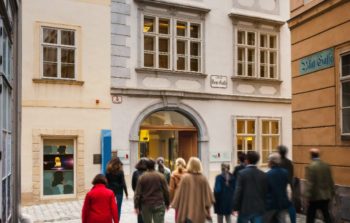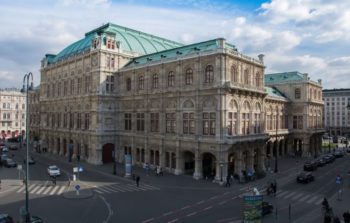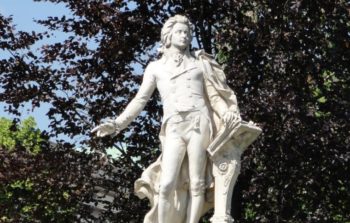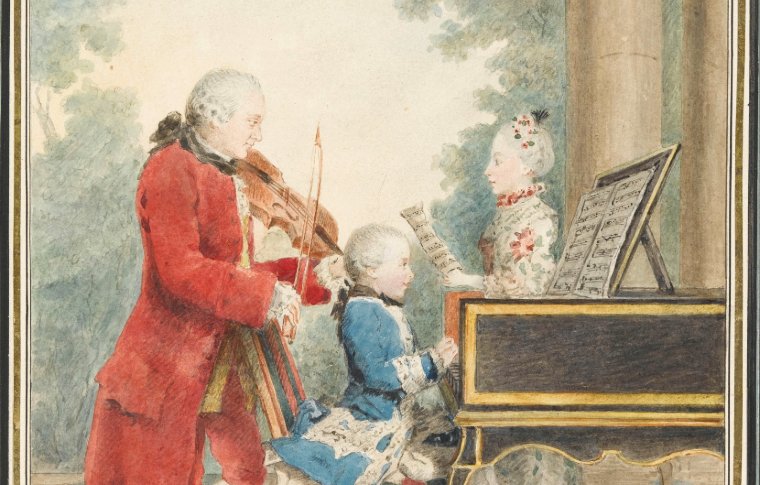My husband and I enjoyed learning about the history of this beautiful city during this walking tour. Our guide, IIse, was extremely knowledgeable, personable, professional, and spoke excellent English. We highly recommend this tour!
Vienna: City of Music
3-Hour Tour
Experience Mozart & Beethoven’s Vienna
Discover how the Habsburgs Shaped Classical Music History
This 3-hour Vienna classical music tour takes you to the major sites where luminaries including Mozart, Beethoven, and Haydn lived, worked, and performed. Learn the secrets of top city attractions including St. Stephan’s Cathedral and Hofburg Palace, explore the connections between the Habsburg dynasty and the elevated status of classical music, and hear highlights of Vienna’s musical masterpieces on speakers or headphones along the way. With expert commentary from your historian guide, step into the world of classical music, and examine the powerful impact of the Habsburg family’s patronage on Vienna’s status as the world capital of classical music.
Visit St. Stephan's Cathedral (Stephansdom), where Haydn, Mozart, Salieri, and Vivaldi performed to rapturous applause in centuries gone by.
Stroll by important places Mozart and Beethoven called home in Vienna, such as 'Figaro' House - where Mozart resided from 1784 to 1787 - and Beethoven's Pasqualati House.
Pass by Beethoven's monument and explore his erratic life, living in sixty different apartments throughout Vienna.
Finish at the residence where Archduke Rudolph took piano lessons with Beethoven, and to whom Beethoven dedicated his Missa Solemnis for his support. Here, we explore the connections between the Habsburg dynasty and the elevated status of classical music.
Consider Vienna's continued musical dominance outside the Vienna Opera House, one of the great contemporary opera stages, and the Musikverein, home to the world-famous Vienna Philharmonic. For added color and context, we pause throughout our tour to enjoy selections of Vienna's musical masterpieces on headphones.
Tour Details
Price
Private tour – $390 USD (1-10 persons)
*your guide all to yourself
Small groups – $125 USD per person
*still intimate with 8 persons or less
Departure time
Private tours daily at 9:30 AM and 2 PM
Small groups
- Tuesday 9:30 AM
- Friday 9:30 AM
- Sunday 9:30 AM
Meeting point
Private tours include a pick-up at your central hotel or flat
Small groups: Café Mozart, Albertinaplatz 2 (Coffee house popular with musicians from the opera house)
Availability
Year-round
Duration
3 hours
Group size
Private tours: 1-10 persons
Groups of over 10 should contact us at info@insightcities.com in order to get a special rate for their party.
Small groups: 2-8 persons
Participation requirements
As this is a walking tour, please contact us if you have any mobility issues or concerns
What to bring
Comfortable walking shoes
About your guide
Read about our Vienna guides
Cancellation policy
For cancellations 48 hours prior to your scheduled tour, Insight Cities offers a full refund. We cannot refund cancellations within 48 hours of a scheduled tour as we need to pay our guide.
Overview of Your Tour

An Introduction to Classical Music in Vienna
As home to world-famous composers including Wolfgang Amadeus Mozart, Ludwig van Beethoven, and Joseph Haydn, Vienna is rightly nicknamed ‘the City of Music‘. The question is, what made Vienna so attractive for young musicians seeking their fortune? Perhaps surprisingly, the answer to that lies within the ranks of the ruling Habsburg family itself.
Throughout this guided 3-hour classical music walking tour, we explore key sites linked to Vienna’s musical history and heritage. For added color and context, we pause to enjoy selections of Vienna’s musical masterpieces on headphones along the way.

St. Stephan’s Cathedral and the “Figaro” House
Our guided walk leads us first through the ancient inner city, close to St. Stephan’s Cathedral (Stephansdom) and the so-called ‘Figaro‘ house – where Mozart lived from 1784 to 1787, and wrote many of his most important operas and instrumental works.
Throughout our tour, we delve deeply into the era of classical music, exploring the lives and differing career paths of Mozart, Beethoven, Haydn, and their contemporaries. For instance, Haydn spent a long period of his life in the service of the prosperous Hungarian Esterházy family at their palace in Eisenstadt. Mozart, in contrast, arrived in Vienna in 1781 after quitting his service at the court of the Archbishop of Salzburg. He went on to become one of the first freelancers to try and make his own living, by teaching the daughters of high aristocrats, performing at public concertos, and, of course, composing.
In the days when the Habsburg dynasty dominated Europe’s political, social, and cultural landscape, music was an essential part of high aristocracy education – functioning as a crucial mode of courtly status and socialization. The most renowned musicians of their time were invited to perform at the Schönbrunn Palace, and it’s here that a young Amadeus Mozart famously played the piano blindfolded. Over the centuries, the Habsburgs served not only as patrons of music but also as performers and even creators of it.

Vienna Opera House and the Musikverein
We conclude our discussion of the Habsburg‘s musical legacy outside the legendary Vienna State Opera (Wiener Staatsoper) – one of the world’s greatest contemporary opera stages – and the Musikverein concert hall, home to world-famous Vienna Philharmonic. Admired far and wide for their immaculate acoustics, these elegant buildings have played host to many of classical music’s most significant recitals and concertos.

The Pasqualati House on Mölker Bastei
Next, we head to one of the apartments Beethoven took over the years – the Pasqualati House on the corner of Mölker Bastei – directly opposite the University of Vienna. Beethoven had a restless life in Vienna, changing residence almost sixty times. Despite these obvious disruptions, his music came to symbolize the apex of the Classic era, and heralded the many important developments of the Romantic era.
Though Beethoven’s relationship with the high aristocracy was often strained, he counted Archduke Rudolph – the youngest son of Emperor Leopold II – among his closest friends. The circuit of our walk is completed at the very residence where Rudolph took piano lessons with Beethoven, one of his most ardent supporters and patrons. Among other compositions, Beethoven dedicated his ‘Missa Solemnis‘ to Archduke Rudolph, a piece that represents the profound relationship between the Habsburg family and the most important musicians in Vienna during the 18th and 19th centuries.
See Our FAQs for More Information
See What Our Guests are Saying
One of the best tours I had. Full of information, from someone who knows what’s he is talking about. A must do.
Fantastic tour! Historical, great way to start in Vienna! The Guide Angelika was amazing! Brilliant!














